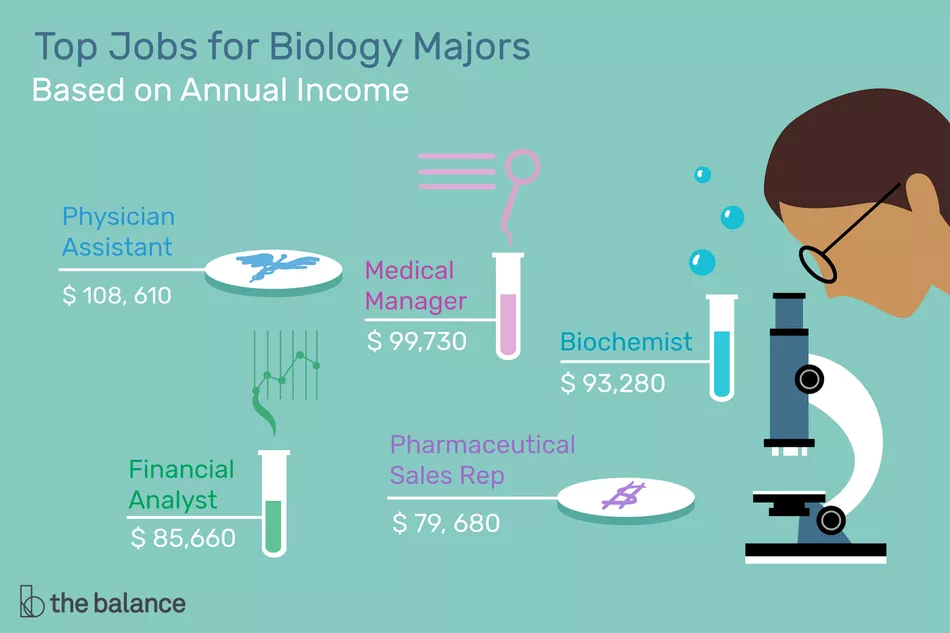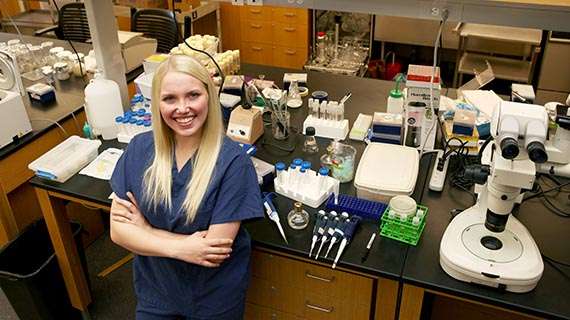Reasons Why You Should Study Biology
In this article, Ive compiled 10 reasons to study biology provided you have a passion for it or can develop one. It encompasses all branches of biology with each field being equally important. The article is kind of long slightly above 2000 words, so you might need to grab some snacks.
If you are considering studying biology but just arent sure what a feature in biology holds for you, this article should help you decide. Here are 10 reasons you should consider studying Biology.
What Jobs Do Different Science Degrees Lead To
Many science degrees will open up a variety of jobs for you. For example, whatever subject youve studied, you can become a research scientist in your specialist area.
A chemistry or chemistry-related degree can lead to a graduate career in industries such as manufacturing, pharmaceuticals, petrochemicals and healthcare. Specific job roles include analytical scientist, chemist, medical scientist, forensic scientist, pharmacologist and toxicologist.
A biology or biology-related degree can lead to a graduate career in areas such as agriculture, biomedicine, environmental conservation, food and drink, genetics, horticulture and marine biology. Specific job roles include biologist, microbiologist, marine biologist, biochemist, biotechnologist, geneticist and zoologist.
A physics or physics-related degree can lead to a graduate career in several career sectors, including aerospace and defence, automotive, computing, healthcare and telecommunications. Specific job roles include physicist, geophysicist, nanotechnologist, astrophysicist, medical physicist and meteorologist.
If you decide that you dont want to become a scientist, science degrees open up plenty of alternative career routes. You could become a science journalist, work in technical sales, or try your hand at teaching or lecturing. Or, if youd like to work on the legal side of science, you could become a patent attorney. Science graduates also often find work in business and finance.
Study Biology And Life Sciences In The Us
If you are an international student interested in nature and science, studying biology or life sciences in theUnited States might be the path for you. The life sciences comprise of the fields of science that involve livingorganisms such as microorganisms, plants, animals, and human beings, as well as related considerations such asbioethics. Biology, the study of life, is the most prominent of these sciences, but technological advances inmolecular biology and biotechnology have led to a proliferation of specializations and new, often interdisciplinary,fields.
Read Also: Should College Prices Be Lowered
What To Expect In A Biology Major
Biology is essentially the study of life, which is an incredibly broad concept. The field draws on many other disciplines, including physics, mathematics, chemistry, geology, law, statistics, psychology, and more.
In fact, your first year or two studying biology will probably focus largely on 100-level classes in a variety of fields. Gradually, as you progress, you’ll begin to take more specialized courses, which could include topics like:
| Anatomy and physiology | |
|---|---|
| Evolution | Zoology |
Most colleges publish required course lists for their degrees, and these are a valuable source of information. Take a look at the required course lists for the different biology degrees offered at your potential universities to help determine which biology degree you’re most interested in.
What Should I Study If I Want To Do A Biology Degree

Most universities want to see some evidence confirming a prospective students interest in biology before accepting them on a degree course, so studying biology at school/college prior to university is a must for anyone hoping to study the subject at degree level.
Often, universities require a student to have achieved a certain standard in another science or mathematics subject, such as chemistry, physics, psychology, geography, geology or maths. Relevant work experience is also something worth pursuing for prospective biology students, not only because it may help them to decide whether there is a specific field they want to specialise in but also because it shows a willingness to go beyond school-level education to study.
For example, a student interested in studying zoology at degree level may try to obtain work experience in a veterinary surgery, a zoo, a wildlife trust or even a museum. Some universities require prospective students to pass an entrance examination too, so it is worth looking at course information and requirements in great detail before deciding which universities to apply to.
Also Check: College Hill Free Online Episodes
Youll Strengthen Your Integrity
Furthering your education may test your limits. At times, you may even be tempted to cheat or take shortcuts to lighten your load. College gives you plenty of opportunities to strengthen your personal integrity and stay true to your values.
Roberts warns that bad habits like cheating or cutting corners will follow you into your career. Luckily, youll be able to rely on your discipline, perseverance and help from others to get you through the tough times and earn your degree the honorable way.
Choosing A School To Study Biology
There are many universities across the United States that have strong biology programs there is no one bestcollege at which to study biology. When choosing a school at which to study biology and life sciences, try to lookfor schools that fit your needs, budget, and lifestyle. Would you prefer a large university, or a small one? Largeschools offer broad course work, a variety of specialized concentrations, and many opportunities for independentresearch. Small schools offer small class sizes, individualized instruction, and frequent interaction withprofessors.
When choosing a school at which to study biology, there are several factors you should take into consideration:
You May Like: Dorm Size Bed
Unit : Cellular Reproduction: Meiosis
Meiosis is a specialized type of cellular reproduction that only occurs in the ovaries and testes and results in an egg or sperm, respectively. Sexual reproduction is responsible for the amazing amount of diversity within a species. When sperm fertilizes an egg, the resulting offspring contain genes from the father and the mother. In essence, you contain genes from ALL of your ancestors, at least in a small part.
Completing this unit should take you approximately 4 hours.
Help You Protect Yourself And Educate Others
Another great reason for studying biology is the amount of safety information with which it enriches you. Biologists are so aware of their environment that they tend to live healthier lives than the average Joe. Your knowledge of pathogen, bacteria, fungus, and other disease carrying vectors forces you to take hygiene more seriously and also deter you from engaging in or living in environments that are too risky for health.
Not only will biology help your personal health but also you get to teach others, like friends and families, about the potentially harmful risks of certain living and non-living things around them. For example, a dog owner may not be aware that a dogs feces or kissing your dog can transfer salmonella to you. The family or friend can also learn how to store things like meat, poultry, and fish to minimize the risk of bacteria infecting it.
In a nutshell, biology helps you and your loved ones lead a healthier life.
Read Also: Does Trade School Count As College
Biochemistry Or Molecular Biology
A major in biochemistry or molecular biology would focus on studies of life at the cellular level. You would learn about the chemical reactions inside living cells and the roles they play for the organism’s overall functioning. This major can be a good choice if you are interested in research. You will need an advanced degree to work as a scientist, but a bachelor’s degree could lead to a sales or administrative position in the pharmaceutical industry.
Biology Major What Do You Study
< p> Hi, I’m curently a freshman taking an introductoy course in biology, and am beginning to consider it as a major. However, it’s a marine bioogy course, but we still discuss things such as genetics, cells and darwinism. If I choose to beome a biology major, what things should I expect to study? REgualr biology is different from marine biology, so I know I won’t be studying exactly what I am now. My college’s course catalog is very, VERY vague and it’s not clear on what things we actually study in the courses.Can you give me some examples of what I’d be studying in this major??< /p>
< p> in intro biology courses, you will study:cell & molecular biology: DNA, RNA, replication, transcription, translations, mutation, proteins, glycolysis, kreb cycle, photosynthesis, mitochondria, nucleus, chromosome action, cell membrane, developmental biology..etc.plant & animal physiology: hormones, how kidneys work, how neurons work, how plants transport nutrients and water…etc.mendalian genetics, mitosis, meiosis blah blah blahEcology, evolutionary biology: phylogeny, competition, natural selection, cost & benefits trade-offs blah blah blah…< /p>
< p> when you go to upper division bio courses, you will learn more indepth knowledge in these topics (signal transduction pathways, urea cycle, fatty acids synthesis, nucleic acids synthesis, enzyme kinetics, microbiology…blah blah blah.< /p>
< p> you will also need to take intro courses in physics, math and ochem.< /p>
You May Like: Is Central Texas College Regionally Accredited
How To Study Biology
Courses in biology combine practical and theory work with a mixture of lectures, seminars and lab work. Students who choose to study biology can expect to expand their knowledge of cell theory, evolution, genetics, energy and homeostasis.
Most universities will offer degree programmes in biology and will also offer a joint degree programme with other sciences or the social sciences. Some universities will offer more specialised degrees within the biological sciences, such as zoology or ecology. Assessments will vary across exams, coursework, presentations and lab work. Students will often be required to conduct research of their own, to answer a question of their choosing generating exactly the sort of skillset that employers are seeking. This is often in a team, so students will be developing their skills in communications, delegation, research and management.
Bachelor Of Arts Vs Bachelor Of Science In Biology

In general, a BS degree provides a more science-focused education, while a BA degree includes language and humanities courses.The type of major you choose should depend on your ultimate career goals.
If you plan to pursue advanced study in biology or medicine, a BS degree might be the best choice. Although most medical schools don’t specifically require a BS, earning this degree instead of a BA may help you meet more prerequisites.
If you’re not interested in going to grad school or specializing in a certain area, a BA might be a better choice. This could also be true if you want to use your biology knowledge in less-scientific fields, like business, education, law, marketing, or politics.
Also Check: Free College Books
Biology Department Learning Outcomes
Biology is the fundamental study of life and living systems. The educational goals of our curriculum foster student excitement about biology and promote science as a process and way of knowing, not merely content knowledge. We offer a strong foundation in biology to prepare for diverse and successful careers and to enrich our students lifelong engagement with the world, in all its diversity and complexity.
We have framed the educational goals for our majors as six skills-based learning outcomes.
What Your Child Will Learn In High School Biology
Science literacy is vital for all citizens as science connects to virtually every aspect of our modern lives. From making decisions on personal matters to engaging confidently in global policy discussions, our understanding of scientific knowledge and where that knowledge originates is fundamental. Research on student learning in science continues to emphasize that students should engage actively in science over multiple years in school. Science learning cannot focus only to the content or the processes of science but must emphasize the interrelationship among three key dimensions of science. The Framework for K12 Science Education, published in 2011 by the National Research Council of the National Academies, defines these three key dimensions as:
Importantly, the three dimensions of science should never be taught in isolation. Instead, they should be regularly integrated throughout instruction and assessment. Science is a body of knowledge, a way of thinking, and a way of constructing an understanding of our natural world. Science literacy is achieved by helping students make sense of their world.
Course content and skills are assessed through a wide range of evaluative measures including tests with objective and written responses, laboratory reports, simulations, research projects, class presentations and home assignments.
You May Like: Sell Used College Book
Wide Selection Of Disciplines
Biology is among subjects with the broadest fields of study. As a lover of biology, youll find there are so many interesting branches of biology that you might be fussy about which one to choose. A long list of choices means youll also face less competition when seeking admission. As is seen in this Biology Online article, there are as many as 50 or so different branches of biology. Ill briefly describe a few of the most popular choices, but you can explore each discipline further to see what it entails.
Biotechnology
Biotechnology is the study of technology for use in modifying living organisms to improve their productivity to humans. This study is employed in the fields of animal domestication, plant cultivation, and the use of genetic modifications to create new better breeds for certain purposes. Biotechnology sees a wide range of applications in genetic engineering and cell or tissue technologies.
Biology
Biology is the study of life and living organisms in terms of physical structure, evolution, physiological mechanisms, chemical process, development, and molecular interactions. Basically, as a Biologist, thats what youll be doing. It is a very broad subject that employs various other sciences, like mathematics, physics, and chemistry in understanding some complex realities. Biotechnology, Biology is also a research-intensive field.
Unit : Basic Chemistry
Nature is not based on one field of study. It incorporates biology, physics, chemistry, and other academic disciplines. Life is multidisciplinary and is driven by chemical processes. Since so many biology topics overlap with basic principles of chemistry, you need a basic understanding and appreciation of chemistry to fully understand biology. For example, in Unit 1 we discussed that the atom is the first part of the biological hierarchy. In this unit, we provide an understanding of this foundational level of organization.
Completing this unit should take you approximately 5 hours.
Recommended Reading: Where Should I Go To College Buzzfeed
What Jobs Can You Get With A Biology Degree
One of the biggest strengths of a biology degree is its versatility. A biology degree can lead to many different careers, depending on how far you want to take your education and whether you want to specialize in a sub-discipline.
The table below lists common career choices among people with biology degrees, as well as some relevant stats from the Bureau of Labor Statistics’ Occupational Outlook Handbook.
| Career | |
|---|---|
| Bachelor’s degree | 19,300 |
The careers included in this table are varied, and the job outlook, amount of advanced study required, geographical limitations, salary prospects, and advancement potential are all different.
Although it’s a good idea to have some sort of target career in mind when you enroll in school, you don’t need to have everything figured out right away. Many people begin by declaring a general biology major then, as they learn more about potential careers and figure out where their interests lie, they can choose to specialize.
Learn How To Memorize
Biology is the basis of so many of the natural sciences and covers a myriad of topics from osmosis and diffusion to homeostasis and cell biology to virology and immunology. It is truly one of the most diverse subject areas taught at any high school or major university. As such, the study of biology requires a lot of retention, recall, and memorization of information. The following are proven tips for memorizing information as you study biology.
Don’t Miss: Is Ashworth College Recognized By Employers
Ecology Or Environmental Studies
If you are interested in issues like global warming and sustainable development, a major focused on ecology or environmental studies might suit you. Ecologists study biology at the macroscopic level, focusing on the interactions between plants and animals as well as other influences such as environmental chemicals and physical forces. This major could lead to work as a science writer, an environmental planner, a soil technician or related professions.
What Do You Learn On A Biology Degree Course

The first year of a biology course often entails a broad overview of the subject, which allows students to develop an understanding of some of the major sub-disciplines of biology.
This often means a lot of lectures, as well as practical work and in-course assessment. As the course progresses, students should expect to spend less time in lecture halls and more time in laboratories or doing fieldwork, and in most cases students must elect more specialised modules as they progress toward a final research project, which usually comes at the end of the degree course.
Assessment occurs throughout the duration of most biology courses as a combination of exams, assessed practical work, short-answer tests, essays and presentations.
Some universities offer more specialised courses, such as ecology or biochemistry, which have a similar structure to a broader biology degree course but are more focused on one branch of biology. Therefore, most students who opt for a more specialised course are already aware of their main area of interest within the huge array of different biological studies.
Most undergraduate biology courses run for three or four years and a lot of universities offer work experience and overseas study opportunities. As with many science-based subjects, biology majors regularly contain a high number of contact hours, allowing students to experience a rigorous curriculum and preparing them for life after university.
Don’t Miss: How To Sell Used College Books